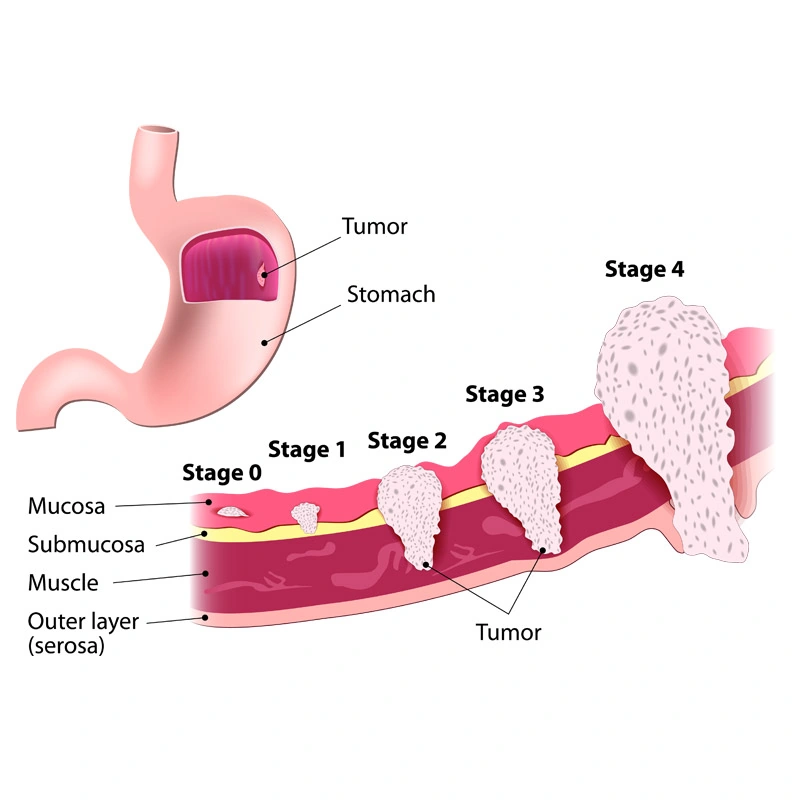Partial Gastrectomy
We offer surgical options for stomach cancer & treatments for perforations of the stomach wall.
Partial Gastrectomy
We offer surgical options for stomach cancer & treatments for perforations of the stomach wall.
What is a Gastrectomy?
Our board-certified surgeon is highly skilled in gastrectomy, the surgical removal of all or part of the stomach. The procedure is typically performed on patients who have stomach cancer, and may also be indicated for a bleeding gastric ulcer, a hole in the stomach wall, and noncancerous polyps.
The stomach connects to the esophagus (the tube that carries food from the mouth) on one end, and the small intestine (the primary site of nutrient absorption) on the other end. When part of the stomach is removed during a partial gastrectomy, the remaining portion continues its digestive function. If the entire stomach is removed, the esophagus is attached to the small intestine, and thus the digestive process begins in the small intestine, and the body eventually adapts. Dietary changes may be necessary.

Procedure for Full and Partial Gastrectomies
The patient is given general anesthesia so they don’t experience pain and have no awareness during the operation. Once the anesthesia has taken effect, a urinary catheter is usually inserted to monitor urine output. A nasogastric tube (i.e., a thin tube from the nose down into the stomach) is also put in. The abdomen is then cleansed with an antiseptic solution.
The surgeon makes a large incision from just below the breastbone to the navel. If the lower end of the stomach is diseased, the surgeon places clamps on either end of the area, and that portion of the stomach is removed. The upper part of the stomach is then attached to the small intestine.
If the upper end of the stomach is diseased, the end of the esophagus and the upper part of the stomach are clamped. The affected portion is removed, and the lower part of the stomach is attached to the esophagus.
In a total gastrectomy, clamps are placed on the end of the esophagus and the end of the small intestine. The stomach is removed and the esophagus is joined to the intestine. Lymph nodes, a section of the pancreas, and the spleen, are often removed in cases of cancer.
In both a full and partial gastrectomy, the abdomen is sutured. The nasogastric tube remains in place and is removed during the postoperative period. Surgery generally takes between 1 and 3 hours, depending on the diagnosis and the extent of the disease.
Preoperative Care
Prior to surgery, patients undergo preoperative testing, which may include x-rays, CT scans, ultrasonography, blood tests, urinalysis, and an EKG.
Medications that thin the blood, such as aspirin, are discontinued several days prior to the operation. Other drugs, such as insulin for diabetes, may be withheld the day of surgery. As soon as the decision to undergo surgery is made, medication usage should be discussed with the physician.
Before undergoing surgery, patients must abstain from solid food and liquid after midnight on the evening before the operation. Upon arrival at the hospital (usually the day before surgery), patients must sign an informed consent form acknowledging that the procedure and risks have been explained and that they are aware that they will receive anesthesia and possibly other medications.
The anesthesiologist speaks to the patient prior to surgery and performs a brief physical assessment. This is to determine the choice and dosage of anesthesia and whether special precautions need to be taken. Patients will be given an intravenous (IV) sedation before entering the operating room.
Step into Wellness: Your Path to a
Lighter, Brighter Future Starts Now
You can trust your Partial Gastrectomy to the skilled, board-certified surgeon at Alabama Surgical Associates (ASA) in Huntsville, AL. For more information about your partial gastrectomy surgery, please click below to contact our office.
Dr. Darrell Doucette has either authored or reviewed and approved this content.
Page Updated: